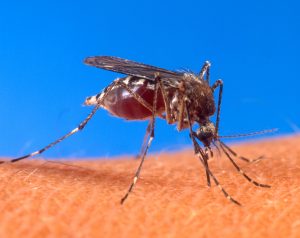Made in Maine: Thoughts on Food, Animals, and Agriculture
Don’t Forget to Vaccinate Your Horse (and Protect Yourself)
By Donald E. Hoenig, VMD
 Over Labor Day weekend in 2009, we had a horse head, on ice, in a garbage can in our garage for four days. As you might imagine, my lovely wife, Lynn, was not too thrilled but over the 36 years that I’ve been a veterinarian, she’s not surprised anymore by some of the strange things that end up in our garage, freezer, or basement. I thought of this when I went for a run this morning in the woods behind our house and a mosquito landed on my arm. Black fly, mosquito, and tick season is certainly in full swing in Maine.
Over Labor Day weekend in 2009, we had a horse head, on ice, in a garbage can in our garage for four days. As you might imagine, my lovely wife, Lynn, was not too thrilled but over the 36 years that I’ve been a veterinarian, she’s not surprised anymore by some of the strange things that end up in our garage, freezer, or basement. I thought of this when I went for a run this morning in the woods behind our house and a mosquito landed on my arm. Black fly, mosquito, and tick season is certainly in full swing in Maine.
In the case of the above-mentioned head, it ended up in our garage because a local large animal veterinarian, Dr. Simon Alexander, and I had euthanized the horse in Unity late that Friday afternoon and the lab in Augusta was closed for the long weekend. I needed to keep the head cold until I could deliver it to the lab the following Tuesday. Sadly, the horse had become so sick from a neurologic disease that it was unable to stand and needed to be humanely euthanized.
As Dr. Alexander and I suspected, later the following week the lab informed us that the horse had died of Eastern Equine Encephalitis (EEE). EEE is a debilitating viral disease that affects horses, many species of wild and domestic birds and occasionally humans. It is transmitted by the bite of an infected mosquito. It may not surprise you to learn that Maine is home to around 45 species of mosquitoes, but less than half can carry EEE. The cycle of transmission for EEE generally goes between infected wild birds and mosquitoes with horses and humans sometimes becoming infected. Infected horses and humans are considered to be “dead end” hosts, meaning that they cannot transmit the virus if bitten by another mosquito.
The signs in humans and horses are all related to central nervous system involvement and can vary from mild to very severe, including death. Horses can experience stumbling or poor balance, unusual behavior, and lethargy. Other signs include head pressing, circling, tremors, seizures, and eventual coma and death. People often experience mild fever, head and body aches, and a lack of energy, and then recover. More severely affected individuals can experience an altered mental status, inflammation of the brain, paralysis, and seizures and, in about 30% of the cases, death. Since it is a viral disease, there is no specific treatment other than supportive measures. The disease in horses has a higher mortality rate, approaching 100%.
2009 was a bad year for EEE in Maine. It had been an extremely wet spring and early summer, and mosquito numbers were very high. Our first case of EEE came in early August in the town of Troy and by late September, a total of 15 horses had died of the disease as well as one llama and three pheasant flocks. Fortunately, subsequent years have not been nearly as bad. Maine didn’t have another equine case of EEE until 2013, when one horse died and one pheasant flock was affected.
The best news to report is that there is a very effective EEE vaccine for horses. Of the 15 horses that died in 2009, all were either not vaccinated or had not been boosted that year. The take-home message for horse owners is to make sure your horse is up to date on its EEE vaccination this year. If you have any questions, consult your veterinarian. Unfortunately, there is not a vaccine for people, so we need to protect ourselves and our kids by wearing long sleeves and pants when outside (especially at dusk and dawn), using repellant on skin and clothes, screening windows and doors, and draining artificial sources of standing water where you live, work, and play.
Dr. Hoenig retired as the Maine State Veterinarian in 2012 and, after completing a year-long Congressional Fellowship in Sen. Susan Collins’ office in Washington DC last year, in January 2014 he started working as a part-time Extension Veterinarian for University of Maine Cooperative Extension.
Dr. Hoenig invites you to submit questions and comments to dochoenigvmd78@gmail.com. Answers to selected questions will appear in future blog posts.
